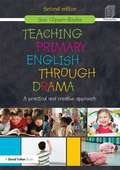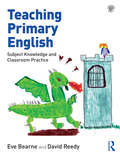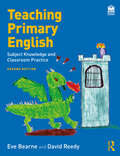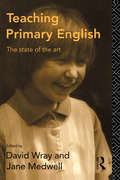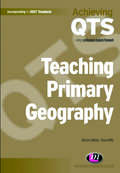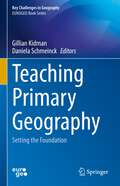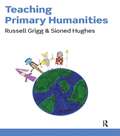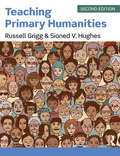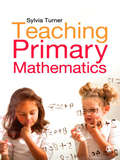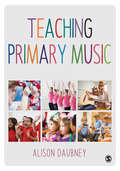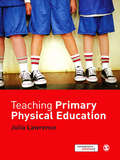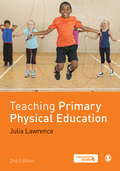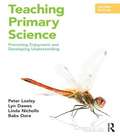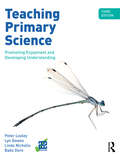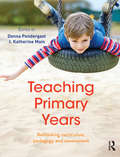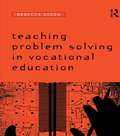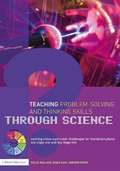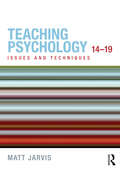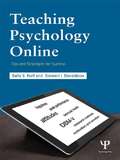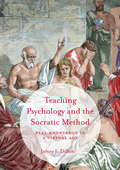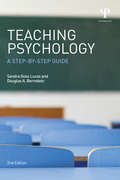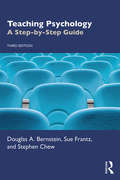- Table View
- List View
Teaching Primary English through Drama: A practical and creative Approach
by Suzi Clipson-Boyles"The text is extraordinarily succinct, very well organised and highly readable. Each chapter examines in depth specific aspects of teaching and learning in drama and well-chosen practical examples can readily be adopted by teachers. A 'must' for all primary schools." Drama (the Journal of National Drama) Review of ‘Drama in Primary English teaching’ Teaching Primary English through Drama builds on the success of the classic text Drama in Primary English, inspiring ideas and techniques for teaching English skills through the medium of drama. Focusing on the power of drama to promote effective learning in primary education, Suzi Clipson-Boyles demonstrates how reading, writing, speaking and listening skills may be developed in ways that will motivate and engage pupils. She uses specific examples from the English curriculum, and also makes links to other areas of the curriculum. In addition, the book explains how assessment during drama can help teachers to evaluate pupils’ progress in English. Further guidance is given on how drama can enrich studying for pupils who are learning English as a foreign language. The book also provides a chapter on developing drama as an art form in its own right, with simple ideas and practical suggestions on how to enhance performances. Teaching Primary English through Drama presents a wide range of drama approaches from ten-minute starter activities to stimulate ideas such as fun ways to practise reading, through to longer projects that can provide contexts for extended writing or help with presentation and performance. The chapters show how drama can help to bring lessons alive in imaginative ways that not only promote enjoyment but also enhance achievement. This comprehensive and practical guide offers essential reading for primary teachers and other practitioners, and is a valuable resource to trainees. It also provides an excellent foundation for those who wish to extend their expertise further towards drama as a subject specialism.
Teaching Primary English: Subject Knowledge and Classroom Practice
by Eve Bearne David ReedyTeaching Primary English is a comprehensive, evidence-informed introduction designed to support and inspire teaching and learning in the primary school. Written in a clear and accessible way, it draws on the very latest research and theory to describe and exemplify a full and rich English curriculum. It offers those on teacher training courses, as well as qualified teachers who are looking to develop their practice, subject knowledge and guidance for effective, enjoyable classroom practice. Advice and ideas are supported by explicit examples of good teaching linked to video clips filmed in real schools, reflective activities, observational tasks and online resources. Each chapter includes suggestions for great children’s literature, considers assessment throughout and offers support planning for diversity and special educational needs. Key topics covered include: spoken language for teaching and learning storytelling, drama and role play reading for pleasure early reading, including phonics poetry writing composition spelling and handwriting grammar and punctuation responding to and assessing writing multimodal, multimedia and digital texts. With a focus on connecting all modes of English, the global and the local, and home and school experience, this detailed, uplifting book will support you in developing a curious, critical approach to teaching and learning English. Additional content can be found on the fantastic supporting website. Features include: video clips from within the classroom to demonstrate English teaching techniques audio resources, including an interactive quiz, to check understanding and provide real-life examples and case studies downloadable resources to support teaching and incorporate into lesson plans.
Teaching Primary English: Subject Knowledge and Classroom Practice
by Eve Bearne David ReedyNow in its second edition, Teaching Primary English is a bestselling, comprehensive, evidence-informed guide designed to support and inspire teaching and learning in the primary school. Written in a clear and accessible way, it draws on the very latest research and theory to describe and exemplify a full and rich English curriculum. It offers those on teacher training courses, as well as qualified teachers who are looking to develop their practice, invaluable subject knowledge and guidance for effective, enjoyable classroom practice. Throughout there is an emphasis on equity and inclusion. Advice and ideas are supported by explicit examples of good teaching linked to video clips filmed in real schools, reflective activities, observational tasks and online resources. Each chapter includes suggestions for great children’s literature, considers assessment throughout and offers support in planning for inclusion and special educational needs. New and expanded areas for this edition include: Multimodal texts Increased coverage of Early Years Dialogic learning and oracy Comprehensive companion website with revised and additional resources A new section on digital literacies Reading for pleasure Teaching grammar in context Critical literacy With a focus on connecting all modes of English, the global and the local, and home and school experience, this detailed, uplifting book, includes inspiring case studies throughout and will support you in developing a curious, critical approach to teaching and learning English. Additional content can be found on the fantastic supporting website. Features include: Video clips from within the classroom to demonstrate English teaching techniques Audio resources, including an interactive quiz, to check understanding and provide real-life examples and case studies Downloadable resources to support teaching and incorporate into lesson plans.
Teaching Primary English: The State Of The Art (Qts Ser.)
by Jane Medwell David WrayFirst published in 1994. Routledge is an imprint of Taylor & Francis, an informa company.
Teaching Primary Geography (Achieving QTS Series)
by Simon Catling Tessa WillyWritten with reference to the 2007 Professional Standards for the Award of QTS and initiatives such as the Primary National Strategy, each chapter offers practical guidance on topics such as planning, assessment and the creation of resources. It provides summaries of key topics in primary geography, including the study of places, environmental sustainability, learning beyond the classroom, global issues, citizenship and cross-curricular approaches to promote children’s subject knowledge, well-being and learning within primary geography. With research summaries, practical and reflective tasks, and classroom examples, this book helps trainees and NQTs teach primary geography confidently and creatively throughout the primary school.
Teaching Primary Geography: Setting the Foundation (Key Challenges in Geography)
by Gillian Kidman Daniela SchmeinckThis book provides an international perspective on teaching and learning geography in the primary classroom. It describes the essence of primary school geography and identifies the ‘big ideas’, thereby offering a synthesis of the international geography curricula and classroom profiles against these big ideas. Each chapter discusses current and new research on a set topic, yet a common thread running between chapters is the assessment relevant to that particular topic. By providing a portrait of the central concepts, the essential skills and necessary inquiry processes of a primary geography education, the book will be of interest to education researchers, classroom teachers and the pre-service teacher, curriculum writers and policy writers.
Teaching Primary Humanities
by Russell GriggAs primary subjects are increasingly being taught on an interdisciplinary level, Russell Grigg and Sioned Hughes have created an innovative new text, Teaching Primary Humanities. This new text explores current debate, encourages reflection and provides clear guidance on planning, teaching and assessing the humanities from the Early Years to Key Stage 2. Through a blend of theory and real-life examples, Grigg and Hughes demonstrate the contribution that history, geography and religious education can make to enhancing children’s thinking, literacy, numeracy and ICT skills.Whether you are a trainee or a practitioner, this book will develop your knowledge of how young children’s understanding of place, time and community can be fostered through a play-based curriculum. It will also benefit teachers of older children looking to encourage more independent learning in their schools.About the authors:Dr Russell Grigg is Head of the South West Wales Centre of Teacher Education. He is a trained primary inspector for England and Wales. He has written widely in the field of history and primary education including Wales in the Victorian Age and Becoming an Outstanding Primary Teacher. Dr Sioned Hughes is Senior Lecturer in Initial Teacher Training at the South West Wales Centre of Teacher Education. She has published many educational materials, especially in primary geography. Her work on Patagonia was recognised by the Welsh Books Council as the ‘Bestselling Children’s Book’ in 2011.
Teaching Primary Humanities
by Russell Grigg Sioned V HughesThe second edition of Teaching Primary Humanities, which focuses on history, geography and religious education, has been fully updated to reflect policy developments and recent curriculum changes throughout the United Kingdom. The authors reaffirm the importance of teaching the humanities in a fast-changing world. This is a book packed full of practical ideas to make learning enjoyable, challenging and relevant. This revised edition features: An extended critique of fundamental British values and how these could be taught The role of the humanities in teaching critical literacy skills in an era of 'fake news' A focus on the key concepts of time, place and community in the Early Years New suggestions for professional learning and development Guidance on realistic planning and assessment for busy teachers Links to the most useful, updated websites and resources Chapters include tasks, research briefings and points for reflection to stimulate further thinking. Teaching Primary Humanities should be essential reading for trainee teachers and experienced practitioners looking for support and inspiration to showcase the contribution of the humanities to children’s all-round education.
Teaching Primary Mathematics
by Ms Sylvia TurnerTeaching Primary Mathematics covers what student teachers really need to know and why, including approaches to teaching and learning, planning and assessment, and using resources in maths teaching. It also provides a brief historical overview of the teaching of mathematics and examines strategies to enhance learning and development as a confident mathematician in the primary classroom. Informed by seminal and current research, and recent developments in education policy, the book also explores: - the role of mathematics within the primary curriculum - the development of mathematics as a subject of study - the knowledge that can be gained from considering international approaches to mathematics. This is essential reading for all students on primary initial teacher education courses including undergraduate (BEd, BA with QTS), postgraduate (PGCE, SCITT), and School Direct, and employment-based routes into teaching. Sylvia Turner is Senior Lecturer in the Faculty of Education at the University of Winchester.
Teaching Primary Music
by Alison DaubneyHigh quality music education can start children on a journey that lasts a lifetime. This book gives beginning primary school teachers clear guidance on how to successfully teach music without recourse to specialised training. It places music within the wider context of the primary curriculum with clear links to the new National Curriculum in England. It also offers advice on how to provide evidence for and assess musical development and how to plan for music education across the EYFS and key stages 1 & 2. Useful information on using the musical resources in your local community to enhance the opportunities offered to your school is also provided. This is essential reading for all students studying primary music on initial teacher education courses, including undergraduate (BEd, BA with QTS), postgraduate (PGCE, School Direct, SCITT), and also NQTs. Alison Daubney is a music educator, researcher and curriculum adviser at the University of Sussex.
Teaching Primary Music
by Dr Alison DaubneyHigh quality music education can start children on a journey that lasts a lifetime. This book gives beginning primary school teachers clear guidance on how to successfully teach music without recourse to specialised training. It places music within the wider context of the primary curriculum with clear links to the new National Curriculum in England. It also offers advice on how to provide evidence for and assess musical development and how to plan for music education across the EYFS and key stages 1 & 2. Useful information on using the musical resources in your local community to enhance the opportunities offered to your school is also provided. This is essential reading for all students studying primary music on initial teacher education courses, including undergraduate (BEd, BA with QTS), postgraduate (PGCE, School Direct, SCITT), and also NQTs. Alison Daubney is a music educator, researcher and curriculum adviser at the University of Sussex.
Teaching Primary Physical Education
by Dr Julia Lawrence'Trainee teachers will welcome the concise and reader-friendly format this book offers. Julia Lawrence has taken great care to provide a balanced and relevant overview of the major topics trainee teachers often lack confidence in, when planning and delivering lessons. A particularly useful and welcome feature for trainee teachers is the book's companion website with helpful links to teaching resources. This book provides essential reading for all trainee primary teachers.' Nigel Clarke, Senior Lecturer in Physical Education, University of Cumbria. Physical Education is an important part of the primary curriculum and one that provides unique challenges for those involved with its teaching. Teaching Primary Physical Education provides a concise overview of the knowledge, skills and understanding required for the confident teaching of physical education in primary schools. This book offers a balanced and comprehensive overview of the subject, covering issues such as safe practice in PE, inclusion, subject leadership and cross-curricular approaches to physical education supported by an accessible theory-informed approach. Teaching Primary Physical Education is supported by a companion website www.sagepub.co.uk/lawrence, which includes further practical examples of applications, links to relevant literature and teaching resources, offering further student-friendly material for use across different physical disciplines. This is essential reading for all students studying primary physical education on primary initial teacher education courses including undergraduate (BEd, BA with QTS), postgraduate (PGCE, SCITT), and employment-based routes into teaching, and also for those on Sports Studies courses with a Primary PE component. Dr Julia Lawrence is Subject Leader of Physical Education at Leeds Metropolitan University.
Teaching Primary Physical Education
by Julia LawrencePhysical education is an important part of the primary curriculum and one that provides unique challenges for those involved with its teaching. This book offers a balanced and comprehensive overview of the subject, covering issues such as safe practice in PE, inclusion, subject leadership and cross-curricular approaches supported by an accessible theory-informed approach. This second edition includes: · Links to the new National Curriculum in England · Each chapter mapped against the Teachers’ Standards · A new chapter on physical literacy and development in the early years and primary ages · A new chapter on health-focused education and the contribution of PE · Added case studies in every chapter · Enhanced coverage of assessment in PE This book includes a companion website with additional resources!
Teaching Primary Physical Education
by Julia LawrencePhysical education is an important part of the primary curriculum and one that provides unique challenges for those involved with its teaching. This book offers a balanced and comprehensive overview of the subject, covering issues such as safe practice in PE, inclusion, subject leadership and cross-curricular approaches supported by an accessible theory-informed approach. This second edition includes: · Links to the new National Curriculum in England · Each chapter mapped against the Teachers’ Standards · A new chapter on physical literacy and development in the early years and primary ages · A new chapter on health-focused education and the contribution of PE · Added case studies in every chapter · Enhanced coverage of assessment in PE This book includes a companion website with additional resources!
Teaching Primary Science: Promoting Enjoyment and Developing Understanding
by Lyn Dawes Babs Dore Peter Loxley Linda Nicholls'Thought-provoking and entices the reader to take a discerning look at science.' Claire Garven, MA Senior Lecturer at the University of the West of England, Bristol, UK. An approach to planning and teaching primary science that gives children permission to question their own preconceptions. This enables teachers to encourage children to actively think and discuss what they see, and give reasons for their developing scientific ideas. Strongly recommended for teachers who want their children to learn to think scientifically.' Jane Gibson, Senior Lecturer and Coordinator of primary science in ITE at the University of St Mark and St John (Marjon), UK This second edition brings science subject knowledge and pedagogy together to support, inform and inspire those training to teach primary science. Written in a clear and accessible way, the book provides comprehensive coverage of science themes. Ideas for teaching and examples from practice provide a basis for inspiring children to explore science and look at the world in new and intriguing ways. Hallmark features Ideas for practice exemplify how you can help children to use scientific knowledge and concepts to satisfy their curiosity about natural phenomena. Something to think about scenarios help to extend and develop your own understanding of key ideas. The companion website includes links to suggested reading and Teachers TV clips for your own development and for use in the classroom. New to this edition A new chapter called Views of Science Learning encourages the teacher to take a central role in helping children develop scientific attitudes, skills and conceptual understanding. Learning Outside the Classroom is a new chapter that provides ideas and guidance that helps to develop childrenâ TMs scientific skills and knowledge, while also promoting positive attitudes to science. New Global Dimensions sections offer starting points for discussion and research into how scientific ideas can be positively applied and can be used to evaluate the impact of human activity on the natural world. Talk Skills and Science Discussion sections enable you to develop children's scientific knowledge and verbal reasoning skills.
Teaching Primary Science: Promoting Enjoyment and Developing Understanding
by Lyn Dawes Babs Dore Peter Loxley Linda NichollsThis fully updated third edition brings science subject knowledge and pedagogy together to support, inform and inspire those training to teach primary science. Written in a clear and accessible way, Teaching Primary Science provides comprehensive coverage of a wide range of science themes. With a brand new chapter on STEM education, additional guidance on where to find the best resources, and increased emphasis on assessment, story-telling and problem-solving, this book shows how science can offer children pleasure and intellectual satisfaction and help them to develop sound scientific minds. Key features include: Ideas for practice exemplify how you can help children to acquire and use scientific knowledge to satisfy their curiosity about how the natural world works. Something to think about scenarios help to extend and develop your own understanding of key ideas. Examples of classroom situations, dialogues and stories help you see how theory is applied to practice and support you in reflecting on the best methods for teaching. Global Dimension sections offer starting points for discussion and research into how scientific ideas can be positively applied and used to evaluate the impact of human activity on the natural world. Talk Skills and Science Discussion sections enable you to develop children’s scientific knowledge and verbal reasoning skills.
Teaching Primary Special Educational Needs
by Jonathan Glazzard Alison Hughes Annette Netherwood Lesley Neve Jane StokoeToday, there is increased emphasis on the coverage of special educational needs in initial teacher training. This comprehensive introduction begins by looking at inclusion policy and how barriers to achievement can be removed. The SEN Code of Conduct is explained and detailed guidance on Individual Education Plans (IEPs) is included. The book then goes on to give practical advice on the teaching of children with special educational needs in reading, speech and language, the autistic spectrum and behavioural, social and emotional difficulties. Finally, the book considers the wider context looking at partnerships with parents, carers and professionals in other agencies.
Teaching Primary Years: Rethinking curriculum, pedagogy and assessment
by Donna Pendergast Katherine MainThe primary years are recognised as a distinct period in a child's development with significant consequences for ongoing educational success. During this critical time, formal schooling and the associated activities introduce children to new and extended social roles where they learn to cooperate and collaborate with their peers and adults. Children also begin to develop a sense of themselves and their competence in a range of domains including social, academic, sport and music. This edited collection provides specialist guidance in developing curriculum, pedagogy and assessment to meet the needs of primary years children. The text begins by exploring the unique characteristics of this age group including cognitive, social, emotional and physical development. It considers the expectations of teachers, including ethical and legal issues and guidance on how to develop positive learning spaces and collaborative approaches. There is an exploration of the needs of the child including facilitating transition from the early years and into secondary school. The text then considers the curriculum in depth including language and literacy, mathematics and numeracy, science and technology, health and physical education and the humanities. A focus on some of the key challenges in primary education bring the book to its conclusion, including effectively harnessing digital technology, developing age appropriate pedagogies, practising differentiated learning and effective assessment. Rich with insights from experts in the field and featuring case studies and practical examples throughout, this is a key resource for both pre-service and in-service primary teachers. Other professionals working with primary years students and parents will also benefit from engaging with this book.
Teaching Problem Solving in Vocational Education
by Rebecca SodenThe development of thinking skills which will improve learning and problem-solving performance at work is an important aim for vocational education and training. The best of workers - manual, technical, administrative, professional, scientific or managerial - have gained skills in problem solving. This book provides guidelines on how best to teach those problem-solving skills. Rebecca Soden argues that thinking skills are most effectively developed along with vocational competences, and offers practical strategies on which training sessions can be based.
Teaching Problem-Solving and Thinking Skills through Science: Exciting Cross-Curricular Challenges for Foundation Phase, Key Stage One and Key Stage Two
by Andrew Berry Belle Wallace Diana CaveThis highly practical resource book presents ways in which teachers can help to develop children's problem-solving and thinking skills through a range of exciting science topics. The book contains classroom-based activities which have been trialled and evaluated by teachers and children, and helpfully shows how the skills developed through rigorous scientific investigations can be used across all areas of the curriculum. The scientific curriculum requirements are extended with exciting and inspiring problem-solving activities that use scientific skills, for example: fair-testing pattern-seeking surveying classifying and identifying investigations over time designing testing and adapting an artefact open-ended exploration The book contains learning objectives for each activity, step by step guidelines for carrying out each problem-solving activity, basic equipment that's needed, examples of learner's work and guidelines for assessment. This book is a must-buy for all early years and primary school teachers keen to encourage an inclusive but differentiated approach to the development of problem-solving and thinking skills in their pupils.
Teaching Psychology 14-19: Issues and Techniques
by Matt JarvisTeaching Psychology 14-19 - first published as Teaching Post-16 Psychology - is a core text for all training psychology teachers, as well as experienced teachers engaged in further study and professional development. Taking a reflective approach, Matt Jarvis explores key issues and debates against a backdrop of research and theory, and provides guidance on practical ideas intended to make life in the psychology classroom easier. With an emphasis on the application of psychology to teaching psychology, it clearly and comprehensively covers the knowledge essential to develop as a successful teacher. Key issues considered include: The appeal of psychology and what the subject can offer students The psychology curriculum and advice on how to choose a syllabus Principles of effective teaching and learning Teaching psychological thinking Differentiated psychology teaching Choosing and developing resources Using technology effectively. With a new chapter exploring the role of practical work in the post-coursework era, this second edition considers psychology teaching across the 14-19 age range and has been updated in light of the latest research, policy and practice in the field. Teaching Psychology 14-19 is an essential text for all those engaged in enhancing their understanding of teaching psychology in the secondary school.
Teaching Psychology Online: Tips and Strategies for Success
by Stewart I. Donaldson Kelly S. NeffIntended as a resource for psychology educators ranging from teaching assistants to experienced faculty, this book shows readers how to effectively create and manage an online psychology course. Guidelines for preparing courses, facilitating communication, and assigning grades are provided along with activities and assessments geared specifically towards psychology. Pedagogical theories and research are fused with the authors’ teaching experiences to help maximize the reader’s abilities as an online psychology instructor. The book focuses on psychology education at the undergraduate level but it also includes material appropriate for graduate students and professionals. Readers will find helpful examples from all the major content areas including introductory, social, developmental, biological, abnormal, and positive psychology, and human sexuality. Every chapter is organized around 3 sections. The Purpose part introduces the key concepts, theory, and research. The Implementation section reviews the ‘nuts and bolts’ of online teaching, and the Troubleshooting section addresses key problems and potential solutions. 'Text boxes' highlight important tips. The website http://www.TeachingPsychologyOnline.com provides additional tips, links to related articles and other resources, and examples of online psychology assignments from across the discipline. The book addresses: launching your online course; enhancing student/instructor communication; modes of multimedia and how to integrate them into your course including lecture videos, podcasting, blogging, wikis, and social networking sites; creating activities for online courses; assessment and grading; and online education trend including doctoral level education. Ideal for instructors teaching ANY psychology course, from introductory to upper-level undergraduate to graduate courses, this text can be used for developing on line courses in applied areas such as counseling, health, and industrial psychology as well as for courses in social, cognitive, and developmental psychology. Instructors of any technical skill level can use this book, including those familiar with Blackboard to those who are just getting started. Whether you are a seasoned pro or new to teaching psychology online, the tips in this book can help improve your instruction, reduce your prep time, and enhance your students’ success.
Teaching Psychology and the Socratic Method
by James J. DillonThis book presents a lively and accessible way to use the ancient figure of Socrates to teach modern psychology that avoids the didactic lecture and sterile textbook. In the online age, is a living teacher even needed? What can college students learn face-to-face from a teacher they cannot learn anywhere else? The answer is what most teachers already seek to do: help students think critically, clearly define concepts, logically reason from premises to conclusions, engage in thoughtful and persuasive communication, and actively engage the franchise of democratic citizenship. But achieving these outcomes requires an intimate, interpersonal learning community. This book presents a plan for using the ancient figure of Socrates and his Method to realize humane learning outcomes in the context of psychology.
Teaching Psychology: A Step-By-Step Guide, Second Edition (Teaching Psychological Science Ser. #6)
by Douglas A. Bernstein Sandra Goss LucasThis volume provides thoroughly updated guidelines for preparing and teaching an entire course in psychology. Based on best principles and effective psychological and pedagogical research, it offers practical suggestions for planning a course, choosing teaching methods, integrating technology appropriately and effectively, developing student evaluation instruments and programs, and ideas for evaluation of your own teaching effectiveness. While research-based, this book was developed to be a basic outline of "what to do" when you teach. It is intended as a self-help guide for relatively inexperienced psychology teachers, whether graduate students or new faculty, but also as a core reading assignment for those who train psychology instructors. Experienced faculty who wish to hone their teaching skills will find the book useful, too.
Teaching Psychology: A Step-by-Step Guide
by Douglas A. Bernstein Stephen Chew Sue FrantzThis thoroughly revised third edition of Teaching Psychology synthesizes the latest pedagogical research on effective teaching and translates it into recommendations for classroom application. It also takes into account the many changes in the teaching landscape that have taken place in recent years. Covering key topics such as planning a course, choosing teaching methods, assimilating technology, and the integration of teaching into the rest of your academic life, this book also includes an abundance of supportive, supplementary content to guide and inform new teachers. This content will also benefit seasoned teachers who wish to reevaluate their current teaching practices and explore new teaching ideas and techniques. Presenting a comprehensive and cutting-edge teaching guide for psychology teachers, this book is a vital resource for those who are training psychology instructors or undertaking a teaching psychology course. It is also a useful text for more experienced faculty looking to update their current teaching practices.
